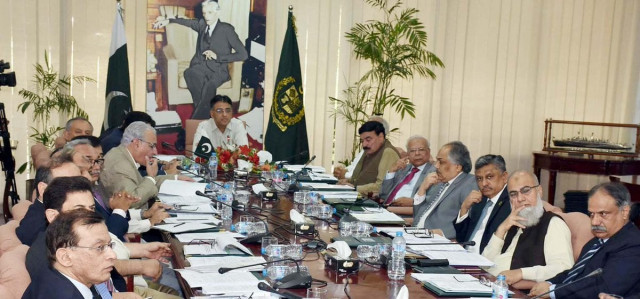ECC: Imported urea becomes costlier but subsidy still to devour Rs1.8b
ECC imposes restrictions on export of sugarcane molasses to curb tax evasion

A file photo of Finance Minister Asad Umar chairing an ECC meeting. PHOTO: RADIO PAKISTAN
Headed by Finance Minister Asad Umar, the Economic Coordination Committee (ECC) of the Cabinet also imposed restrictions on export of sugarcane molasses aimed at curbing the tax evasion in the sugar industry.
The ECC approved the price of imported urea at Rs1,712 per 50 kg bag for National Fertilizer Marketing Limited (NFML) dealers, according to a handout issued by the finance ministry.
The Ministry of Finance also appointed Dr Khaqan Hassan Najeeb as official spokesman on Monday. Dr Najeeb is adviser and executive director general of Implementation and Economic Reform Unit of the finance ministry. He has remained engaged in negotiations with the International Monetary Fund (IMF) and is also involved in drafting the Memorandum of Economic and Financial Policies (MEFP). The MEFP will become the base for next three years for IMF programme.
After the increase in gas prices by the Pakistan Tehreek-e-Insaf (PTI) government, the local manufacturers of urea have increased their prices from Rs1,610 to Rs1,740 per 50 kilogram bag, according to a briefing that Ministry of National Food Security gave to the ECC last month.
Since, the imported urea prices are linked with the local prices, the government also had to increase the prices of the imported quantity. The Ministry of Industry told the ECC that the dealer booking price of the imported urea should be kept lower than the locally produced prices.
Due to hike in urea prices by the local manufacturers, the ECC also had to increase the prices of the imported urea by Rs102 per bag or 6.3%. This will increase the cost of production for the farmers who are already working on very thin margins due to stagnant prices of wheat for the last five years.
In September this year, the ECC had allowed import of 100,000 metric tons of urea to ensure availability of sufficient stocks in the country to meet the requirements in the Rabi season.
The Ministry of Industries had proposed that selling price of imported urea may be fixed at Rs1712 per 50 kilogram by providing Rs865 subsidy. The end consumer price is 66% of the imported cost.
There is no allocation for fertiliser subsidy in the budget. In the previous fiscal year 2017-18, Rs10.8 billion in subsidy had been given on fertiliser, according to the budget documents. The cost of subsidy has been estimated at Rs1.82 billion for 100,000 metric tons of urea.
In order to ensure better supply of the commodity, the ECC had also sanctioned provision of subsidised RLNG to Fatima Fertilizer and agri fertiliser plants about two month ago. These plants also required subsidy of Rs4.7 billion to run on mix of RLNG and locally produced gas.
The growing subsidies could become an issue for the finance ministry that is struggling to keep the budget expenditures under check. So far, Rs25 billion have been given in subsidies to exporters, Rs20 billion supplementary budget for fencing of Afghan border in addition to hundreds of millions of rupees in other supplementary grants.
According to the working of the Ministry of Industries, the cost of 100,000 metric tons of urea excluding the handling charges was Rs5.2 billion.
The per 50 kilogram cost of the imported urea was Rs2,577 including handling charges. This required the government to give Rs865 subsidy for 50 kg bag on old NFML handling charges and Rs913 at new charges. The NFML was charging Rs21 per bag handling charges, which it requested to increase to Rs70.
Molasses export
The ECC approved amendments in the Export Policy Order (EPO) 2016. The amendments have been made to check export of ethanol and other products manufactured from cane molasses to curb tax evasion in the sugar industry.
The export of ethanol will be subject to the condition that cane molasses used in production of ethanol and other products manufactured from cane molasses being exported is either produced in-house by the exporter or purchased directly from a sugar mill, according to the ECC decision.
Proper recording of production and sale of molasses, can be used as an indicator to gauge the production of sugar thus assist in collection of due taxes. The ECC was informed that due consultation had been carried out with the Federal Board of Revenue (FBR) as well as the sugar manufacturers, on the proposal.
The cane molasses is a major by-product of sugar industry. It is either exported by sugar industry or sold locally or consumed in-house for producing ethanol. More than 95% of the ethanol is exported. The FBR suspected huge tax evasion in the sugar industry, which it wants to unearth by property recording the production of molasses.
Published in The Express Tribune, December 18th, 2018.
Like Business on Facebook, follow @TribuneBiz on Twitter to stay informed and join in the conversation.



















COMMENTS
Comments are moderated and generally will be posted if they are on-topic and not abusive.
For more information, please see our Comments FAQ